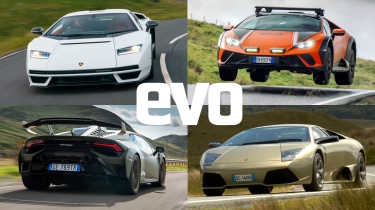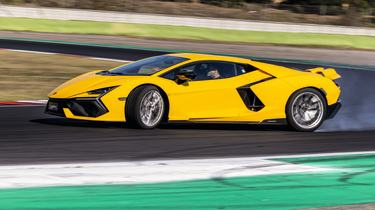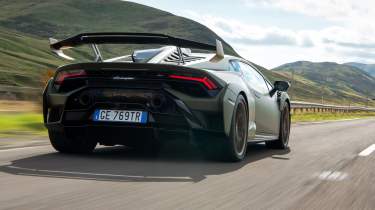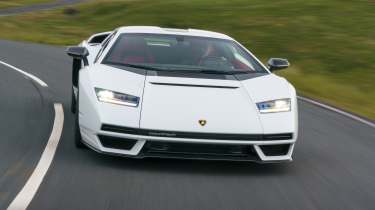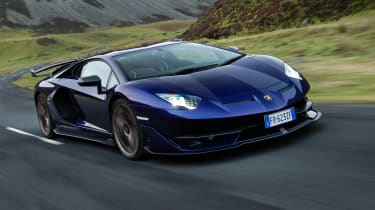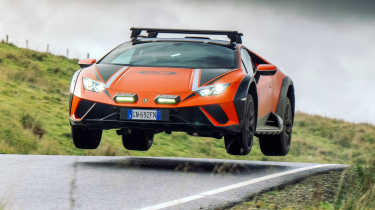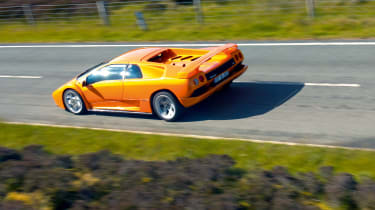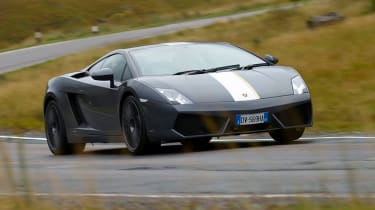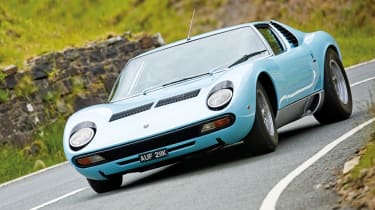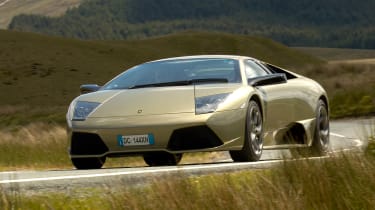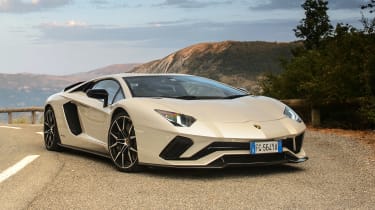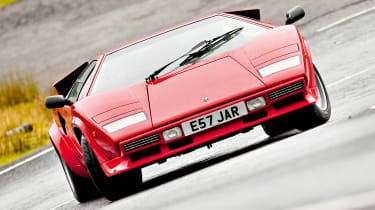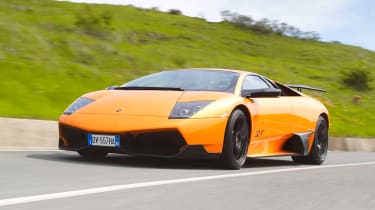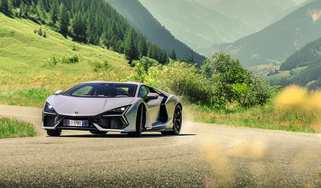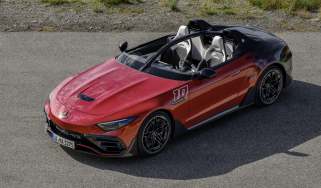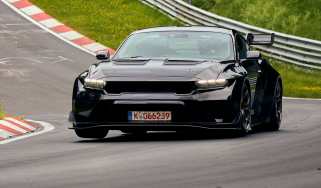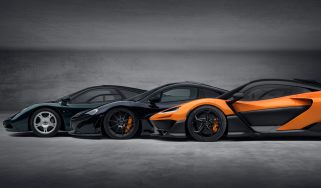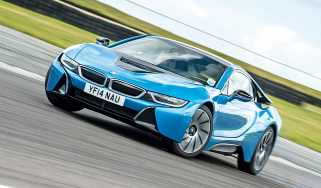Best Lamborghinis – the all-time great raging bulls
You can’t ignore a Lamborghini, and many of Sant'Agata’s creations have hit the right note with evo testers over the years. We run down the very best
We find ourselves in that part of the decade where we are staring down the barrel of an entirely rejuvenated – and for the first time electrified – lineup of Lamborghinis. Who would have thought this time a decade ago, shortly after the introduction of the Huracán, that in ten years, all Lamborghinis would be electrified and that the Huracán successor would have more power than a McLaren P1?
But even with all that power, the new Temerario has a huge amount to live up to, though thankfully the excellent Revuelto has already reassured us that hybridisation might be the making of Lamborghini in this generation. But it also has to have as much of the drama, engagement and personality of its forebears that it can possibly muster. These are the ten greatest Lamborghinis that the Temerario needs to live up to…
> The Lamborghini Temerario is a 10,000rpm V8 Huracán successor with hypercar power
Lamborghini Revuelto
Trepidant is the word to describe all who like cars when they learned the next flagship Lamborghini would be electrified. That the Revuelto was to keep its screaming V12 – with a heightened 9500rpm redline no less – tempered some fears. Nevertheless, change on such a level is often feared when it comes to cars that have for so long traded so heavily on core unchanging tenets – drama, extroversion, attitude.
So was the Revuelto the true ‘Audified’ top-end Raging Bull enthusiasts have feared for over 25 years? In some ways, yes. It’s a far better car than the Aventador and Murcielago that precede it, in that it’s more usable, not as cantankerous in normal driving, more comfortable and better made. But it’ll still drop the jaws of all in view as you hit the start button or send the doors skyward. It’s still an awe-inspiring pinup… but where its predecessors were at times as lumpen and uncooperative at speed as they were around town, the Revuelto shocked and impressed us on first acquaintance.
This is a V12 Lamborghini that’s, if anything, more accomplished a performance car than it is dramatic to look at. At least on track. In spite of the added weight – it’s 1772kg dry compared to the Aventador Ultimae’s 1550kg dry – the rear-steering and torque vectoring from the electric motors lend the Revuelto an agility that’s alien to those who know their V12 Lambos well. But it still feels natural, interpretable and honest – reassuring news given the exact same hybrid system is to be used in the Temerario. There might be a sprawling range of settings for the powertrain and hybrid system, all-wheel-drive system, traction control and chassis dynamics but within coalesces a familiar personality; that of a proper Lambo.
Lamborghini Huracán STO
Big shoes to fill is an understatement when it comes to the Huracán STO, contender for the 2021 evo Car of the Year crown. Perhaps the most accomplished Lamborghini of recent memory, it combines equal parts Sant’ Agatan drama and dynamic excellence to make it a new benchmark for what a Lamborghini should deliver.
Like any Lamborghini should, it has you awestruck from 30 steps away. Get closer and this concoction of GT3-aping aero frippery and traditional wedge-shaped supercar stance has you scrambling for the keys. Thankfully, unlike the original Huracán, once you rouse that uproarious 631bhp 5.2-litre V10 and get underway, the driving experience belies the racecar presentation. Instead we found rocksteady composure, direct steering and dependable brakes on the road that give you the confidence to explore all that character.
Head to the track, warm the tyres and activate all of that aero, and an all-conquering track weapon is revealed. Is it a GT3 car with CarPlay and number plates as the looks suggest? Not quite, but it is every bit Lamborghini’s GT3 RS that will reward and thrill on track all day without breaking a sweat. There’s no doubt it is this that the Temerario should be looking for inspiration.
Lamborghini Countach LPI 800-4
Though it caught a fair bit of flack for wearing the name it does, the modern-day Lamborghini Countach was that rarest of demonstrations that there’s more to Lamborghini than being as mad as possible. There’s an almost Murcielago-esque elegance to it and certainly, a wedge silhouette that you can’t deny pays tribute to the original LP400.
More classically styled it may be but hiding within are the first signs of Lamborghini looking to the future and courting electrification, if only in pursuit of performance. In the Countach LPI 800-4 a supercapacitor hybrid system is married to the familiar 6.5-litre V12 and jerky ISR transmission. The result is Aventador: debugged, with the electrical infill smoothing out the gearbox’s famously jerky shifts and boosting power from 769bhp to a heady 803bhp.
Oddly, we found the Countach was not quite as dynamically well-rounded as the Aventador Ultimae, but what it loses in polish, it surely makes up for in exclusivity and aesthetics. If you roll through Casino Square in one of these, make no mistake, the inevitable handful of Aventador owners will be looking over in envy.
Lamborghini Aventador SVJ
Even if you’re relatively familiar with other supercars, the Aventador SVJ is an intimidating car to drive. On the road, it feels impossibly wide, partly because it really is startlingly broad, but also because you sit so far back, so low down, and observe a sliver of the world through a glasshouse of such poor visibility that even Countach owners would shake their heads.
Then there’s the fact you’re attempting to conduct the machinations of a wildly powerful 760bhp naturally-aspirated V12 through a largely unpleasant automated-manual gearshift from one of the automotive world’s least comfortable seats, while minor controls are scattered around the cabin in a way that makes the smaller Huracan feel as logical as a Golf.
It’s a proper Lamborghini then, and for all its faults and foibles, when you experience the Aventador SVJ in its element, it is wildly exciting, surprisingly capable and thunderously fast. All qualities that helped it top the Nurburgring lap times board until very recently, illustrating both its abilities, and the slightly unhinged nature of Marco Mapelli...
Lamborghini Huracán Sterrato
If the STO is the definition of what a Lamborghini should be on the road and the track, the Huracán Sterrato takes Lamborghini quite literally off the beaten path. For here is a mid-engined supercar better suited to rally stages and rough tracks than racetracks or even your favourite B-road road… or is it?
While sceptical at first, last year’s evo Car of the Year test proved that it’s one of the best ever Lamborghinis in terms of exploitable, accessible fun – it’s a Lamborghini more drivers can enjoy for more of the time. That it rides better than its track-focused sibling shouldn’t come as much of a surprise given its ride height increase and chunky tyres, with 25 per cent softer springs that are also 34mm longer providing the required travel for an off-road vehicle.
But you still have that cacophonous 5.2-litre V10 engine singing behind you. You still have one of the most bonkers-looking road cars out there, with all the off-road frippery – the rubber wings, roof rails, livery and spotlights – only adding to the sense of occasion. And to be clear, it really will go places no other Lamborghini will, bar perhaps the LM002. Limited to just 1499 units, the Sterrato, along with the STO, makes for one hell of a two-pronged farewell for Lambo’s second junior supercar of the 21st-century.
Lamborghini Diablo VT 6.0
Naming your car Diablo sets the tone somewhat. This isn’t supposed to be a friendly car, and the striking proportions (penned early on by Marcello Gandini, who’d also been responsible for both the Miura and Countach before) made no attempt to hide the presence of yet another enormous V12 behind the passenger compartment.
With the benefit of fuel injection, the 5.7-litre unit was now capable of 485bhp, a figure that quickly climbed over time as Lamborghini introduced the SE30 (like the Countach 25th Anniversary, another celebration of the company’s advancing years) with 523bhp and 595bhp SE30 Jota.
2000’s Diablo VT 6.0 wasn’t quite that potent, its six-litre variant of the V12 making 543bhp, but with a decade of development and a helping hand from new owners Audi, it had been turned into a proto-Murcielago, with quality beyond any previous Lamborghini and plenty of ability. Enough, in fact, to finish second in eCoty 2000.
Lamborghini Gallardo Balboni
You’ll find the Huracan Evo RWD elsewhere on this list, a car with all the talents of the rest of the Huracan range but a few of its own too, notably improved steering feel and a more fluid chassis. Well, the Gallardo Balboni was to the standard Gallardo range as the Evo RWD is to other Huracans.
If you recognise the name, it’s because Valentino Balboni was for most of Lamborghini’s history the man responsible for their dynamics, as chief test driver. Balboni retired in 2008, and to pay tribute, Lamborghini named a special Gallardo after him.
Special, because it was rear-wheel drive, and while it lacked the option of a manual gearbox, the 30kg weight saving was welcome, as was the improvement in steering quality, just like the Huracan Evo RWD has experienced recently. The car also got a 542bhp development of the 5-litre V10, calibration tweaks to the “E-gear” automated manual transmission, and a more tightly-wound limited-slip differential. Other “LP 550-2” Gallardos followed, but it was Balboni’s car that set the tone.
Lamborghini Miura P400 SV
As is often the case with Lamborghinis, which tend to remain on sale long enough to go through a few more development cycles than the average car, the final P400 SV was the Miura at its best – short of the extremely rare Jota and SV/J, at any rate.
The Miura set the template for the modern supercar with a mid-engined, two-seat layout, and while its transverse engine layout didn’t survive into the Countach, Diablo, Murcielago and Aventador that have followed since, the Bizzarrini V12 itself certainly did, only bowing out when the Aventador debuted the firm’s second-generation V12 in 2011. Power climbed from the P400’s 345bhp to 365bhp for the P400S and finally 380bhp for the SV.
It was developments to the chassis and aerodynamics that helped the SV realise the Miura formula though, helping to tame a habit for front-end lift at high speeds. Visually, you’ll discern an SV because it’s had its headlight-surrounding “eyelashes” plucked – less distinctive than earlier Miuras perhaps, but the less fussy styling is arguably even easier on the eye.
Lamborghini Murcielago LP640
There were worries that Audi ownership would have a negative effect at Lamborghini. It’s difficult to imagine why today, given what we’ve seen from the company since, but then Audi and Lamborghini were both quite different companies in 1998. As it transpired, Audi began making cars that were actually fun to drive, and Lamborghini’s standards of quality shot up without losing any of their character – a match made in heaven.
The Murcielago, launched in 2001, was the first all-new product under Audi ownership (late Diablos benefited from some gentle massaging). It was spectacular to behold and impressive to drive in its own right, but came into its own with 2006’s LP 640. Tighter and more responsive, it’s one of the best driver’s cars Lamborghini has made.
The 6.5-litre V12 positively screams around to 8000rpm and even the single-clutch automated manual ‘box is effective, but it’s the chassis, tightly-damped, poised and composed, it draws a line between old-school attitude and modern ability.
Lamborghini Aventador S
It took a little time for the Aventador to come into its own, and it did so with the Aventador S introduced in 2017. You won’t find the “basic” variant of any other Lamborghini in this list, but that’s effectively what the Aventador S is, yet it’s among the best-driving of the breed.
That 2017 introducing coincided with a few general updates for the model. The styling was refined, and had never looked better, and the S also gained four-wheel steering and an active electronic rear wing to help it cleave the air more cleanly – while giving downforce an impressive 130 per cent bump.
Then there were new dampers and re-engineered suspension, a bespoke Pirelli tyre, and an adjustable driving mode setting slightly cringingly named “Ego”. But no matter, because the result was the most fluid and natural Aventador yet, with genuine steering feel, a more neutral balance, and of course a remarkable engine that even Lambo’s automated-manual gearbox couldn’t spoil.
Lamborghini Countach LP 5000 QV
Your definitive Lamborghini largely depends on which era you grew up in, but you’d be forgiven for using the Countach in all its forms as a yardstick by which all other Lamborghinis are measured. At the very least visually, whether Marcello Gandini’s perfect 1970s wedge, the LP 400, or the later, bewinged and much-adorned models, that illustrated a wilder side to Lamborghini’s shapes that have arguably been more influential on the marque’s current output.
There’s little doubt the later cars are better to drive though, and that means either the run-out 25th Anniversary launched in 1988 or, ideally, the LP 5000 Quattrovalvole, or QV. We say ideally because while the two are very similar mechanically, ultimately the 25th Anniversary’s even busier restyling (the work of none other than Horacio Pagani) is just a bit too difficult to love.
The QV gets the important parts anyway – that four-valve head, plus a bored and stroked 5.2-litre variant of the amazing Bizzarrini V12 with 449bhp, and the most developed chassis. Heavy controls make the Countach intimidating at first, but the feedback, howling engine and the reward of learning its ways means the Countach is far more than just a dramatic shape.
Murcielago LP 670-4 SV
Ferrari might make a car called the 812 Superfast, and that name might carry plenty of historical weight to it, but you sense the name does it a slight disservice, since Lamboghini’s equivalent SuperVeloce, trips off the tongue so easily. And you’d not call the 812 the “SF”, but the letters “SV” have appended many a Lambo and always signify something special.
The Murcielago was already quite a machine in standard specification and as you’ll read elsewhere on this page, a mighty fine performance car in LP 640 form. So the LP 670-4 SV predictably took things to an even greater level, with 661bhp from its 6.5-litre V12 and significant changes elsewhere.
Among these were visual enhancements aimed at both cooling and aerodynamics. Front and rear spoilers improved the car’s high-speed downforce, while larger intakes fed the brakes. Like many subsequent SVs, the 670-4 made good use of carbonfibre components, shedding 100kg, aided too by a lightweight exhaust and carbon-ceramic brakes. One of Lamborghini’s most extreme cars, at its most extreme.
